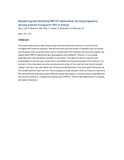| dc.contributor.author | Awiti, Ujiji O | |
| dc.contributor.author | Ekström, AM | |
| dc.contributor.author | Ilako, F | |
| dc.contributor.author | Indalo, D | |
| dc.contributor.author | Wamalwa, D | |
| dc.contributor.author | Rubenson, B | |
| dc.date.accessioned | 2013-06-24T13:04:49Z | |
| dc.date.available | 2013-06-24T13:04:49Z | |
| dc.date.issued | 2011-08 | |
| dc.identifier.citation | Cult Health Sex. 2011 Aug;13(7):829-40 | en |
| dc.identifier.uri | http://www.ncbi.nlm.nih.gov/pubmed/21656411 | |
| dc.identifier.uri | http://erepository.uonbi.ac.ke:8080/xmlui/handle/123456789/39051 | |
| dc.identifier.uri | http://www.tandfonline.com/doi/full/10.1080/13691058.2011.583682#.UmpzFRD16m0 | |
| dc.description.abstract | This study explores type identities among rural and urban slum women on antiretroviral therapies who become pregnant. Narrative structuring was chosen to develop type narratives that illustrate how rural and urban women handle their HIV-infection and how they reason and decide about PMTCT-adherence during pregnancy and childbirth. Women in rural areas described their lives as 'secure and family controlled'. This gave the women security and predictability in life, but also meant that it was difficult to keep secrets about HIV infection. For women in the urban slum area the narratives were a tale of the uncertain and hard to predict reality in the slum, but also about self-reliance and decisiveness. They portrayed themselves as 'vulnerable and striving to survive' thus managing a tough situation without long-term solutions. We conclude that pregnancy poses different social challenges in rural and urban areas affecting how women choose to manage their adherence to PMTCT, which is also affected by HIV stigma and lack of disclosure | en |
| dc.language.iso | en | en |
| dc.publisher | University of Nairobi. | en |
| dc.title | Reasoning and deciding PMTCT-adherence during pregnancy among women living with HIV in Kenya | en |
| dc.type | Article | en |
| local.publisher | Department of Paediatrics | en |

